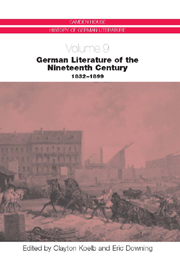Book contents
- Frontmatter
- Contents
- Illustrations
- Introduction
- Part I Contexts
- The Afterlife of Romanticism
- Parallels and Disparities: German Literature in the Context of European Culture
- Revolution and Reaction: The Political Context of Central European Literature
- Part II Movements
- Part III Genres
- Part IV Bibliographical Resources
- List of Primary Sources
- Selected Secondary Works Cited
- Notes on the Contributors
- Index
Parallels and Disparities: German Literature in the Context of European Culture
from Part I - Contexts
Published online by Cambridge University Press: 05 February 2013
- Frontmatter
- Contents
- Illustrations
- Introduction
- Part I Contexts
- The Afterlife of Romanticism
- Parallels and Disparities: German Literature in the Context of European Culture
- Revolution and Reaction: The Political Context of Central European Literature
- Part II Movements
- Part III Genres
- Part IV Bibliographical Resources
- List of Primary Sources
- Selected Secondary Works Cited
- Notes on the Contributors
- Index
Summary
To place german literature in the context of European culture is a tall order. What René Wellek called “the ‘foreign trade’ of literatures” has been examined with extraordinary thoroughness in regard to nineteenth-century German literature and its European connections because they are so numerous, so dense, and so influential. The impact particularly of Goethe and the Romantics has been the subject of countless studies. The processes of transmission are supported by other types of documentation: for instance, the reports of such travelers as Henry Crabb Robinson, Charles de Villiers, and Mme. De Staël, and the mapping of the demography of translations. To these analyses of specific aspects must be added more wide-ranging surveys like Rosemary Ashton's The German Idea (1980) on Coleridge, Carlyle, G. H. Lewes, George Eliot, and German thought, her subsequent book, Little Germany: Exile and Asylum in Victorian England (1986), and my own Romanticism in Perspective (1969) and Counterparts (1977). There is, therefore, ample scholarly evidence of the wealth of contacts between German and European writers in the nineteenth century.
Nevertheless, Wellek's objection to an exclusive concentration on “the ‘foreign trade’ of literatures” remains a valid warning. The mere fact of an established contact says nothing about its meaning; the sheer quantity of contacts between German and European writers must always be tempered by consideration of their quality. For example, when Wordsworth and Coleridge visited Klopstock, they were able to converse only in schoolboy Latin, a fact that must arouse misgivings about the productivity of this meeting.
- Type
- Chapter
- Information
- German Literature of the Nineteenth Century, 1832–1899 , pp. 45 - 62Publisher: Boydell & BrewerPrint publication year: 2005



